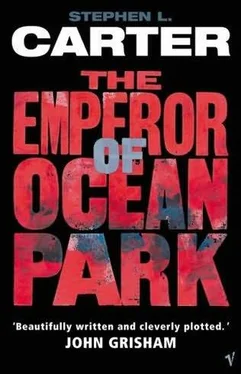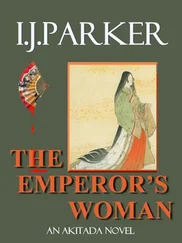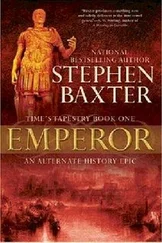Stephen Carter - Emperor of Ocean Park
Здесь есть возможность читать онлайн «Stephen Carter - Emperor of Ocean Park» весь текст электронной книги совершенно бесплатно (целиком полную версию без сокращений). В некоторых случаях можно слушать аудио, скачать через торрент в формате fb2 и присутствует краткое содержание. Жанр: Криминальный детектив, на английском языке. Описание произведения, (предисловие) а так же отзывы посетителей доступны на портале библиотеки ЛибКат.
- Название:Emperor of Ocean Park
- Автор:
- Жанр:
- Год:неизвестен
- ISBN:нет данных
- Рейтинг книги:3 / 5. Голосов: 1
-
Избранное:Добавить в избранное
- Отзывы:
-
Ваша оценка:
- 60
- 1
- 2
- 3
- 4
- 5
Emperor of Ocean Park: краткое содержание, описание и аннотация
Предлагаем к чтению аннотацию, описание, краткое содержание или предисловие (зависит от того, что написал сам автор книги «Emperor of Ocean Park»). Если вы не нашли необходимую информацию о книге — напишите в комментариях, мы постараемся отыскать её.
Emperor of Ocean Park — читать онлайн бесплатно полную книгу (весь текст) целиком
Ниже представлен текст книги, разбитый по страницам. Система сохранения места последней прочитанной страницы, позволяет с удобством читать онлайн бесплатно книгу «Emperor of Ocean Park», без необходимости каждый раз заново искать на чём Вы остановились. Поставьте закладку, и сможете в любой момент перейти на страницу, на которой закончили чтение.
Интервал:
Закладка:
Ah, sweet marriage! My parents always described it as the fundamental institution on which civilization rests. My sister and I, whatever our weaknesses, have tried to behave as though we believe it. But Addison, for all his outward signs of religious fervor, behaves otherwise. His first wife was a schoolteacher in the Philadelphia public schools, a sweet, quiet woman of the darker nation, whose name was Patsy. Patsy and my brother immediately fell to fighting over when they would be able to begin a family. My brother, like many a man not ready to commit himself to the marriage to which he is already committed, had a single, consistent answer: Later. Patsy left him in the third year. Disaster followed. For a while, there was, it seemed, a woman a week, including one horrible Thanksgiving two years after my father’s disgrace when he arrived at Shepard Street with a garishly made-up child who looked about fifteen and dressed like a hooker. (She was, we quickly learned to our relief through smooth questions from my mother, twenty-two and some sort of minor star on the soaps; Sally, late as usual, recognized her at once and went into paroxysms of jealous awe.) Addison and Cali-for that was the unlikely name of his date-stayed at dinner just long enough to be rude, then hurried off, explaining that they had a long drive back to New York, but really, so he told me out in the driveway, to visit other friends in Maryland, two male screenwriters who had built a gorgeous house on the water near Queenstown. That was Addison, at least until recently. He liked to be seen with actresses, models, singers, little mindless wisps of sexuality-but not always. For a while, he set up housekeeping in Brooklyn with a half-mad convicted bomber named Selina Sandoval, who never met a protest she didn’t like, unless it was against abortion. Selina kept guns all over the apartment and saw Addison as fascist but educable, which is roughly the way that Addison sees me. As for Addison, he described his interest in Selina as “research for a novel”-which, like so many of his ideas, has yet to be started. When Selina finally got too crazy and landed back in jail, she was followed by a flight attendant, then a commodities broker, then a moderately famous tennis player, then a waitress at his favorite deli, then one of the stars of the Dance Theater of Harlem, then a police detective, which was my brother’s idea of a joke. Eventually, Addison settled on a second wife, Virginia Shelby, a graduate student at the University of Chicago, an anthropologist, a woman of friendly smile and intimidating intellect, someone at last my father and mother thought good enough, a union that we thought would calm him down. Everybody loved Ginnie, everybody but Addison, who swiftly tired of her nagging him about-what else?-starting a family. He left her a year and a half ago for a twenty-four-year-old production assistant on his radio show. Although it is styled as a trial separation, nobody seriously expects Addison and Ginnie to resume their conjugality, which is why nobody is surprised when he shows up at the funeral with a perfect stranger, a skinny, shamelessly clinging white woman named Beth Olin, who is some sort of minor poet, or maybe a playwright-there isn’t time to find out the details during this brief visit, and we never see her again.
CHAPTER 5
Kimmer keeps firm hold of my hand as we stand beside the grave, shivering in the chill as Father Bishop pronounces the words of committal. Freeman Bishop, who has been rector of Trinity and St. Michael, it sometimes seems, since before the Deluge, is in the Episcopal tradition of scholarly priests, possessing the deep knowledge of theology and church history that was once the common expectation for clergy of the Anglican communion. My father, however, always spoke ill of the man. The reason was politics. The Episcopal Church has lately been battered by stormy conflicts on everything from the ordination of gays and lesbians to the authority of the Bible. Father Bishop, in the Judge’s view, was on the wrong side of every fight. They don’t understand, my father would moan, referring to those with whom he disagreed, that the church is steward and custodian of moral knowledge, not its originator! They think they’re free to change whatever they want to fit the fashion of the moment! Right or wrong, the Judge was always strident; and, always, he seemed more comfortable mourning the world that had passed away than planning for the one rushing toward him.
As for Freeman Bishop, whatever his complicated politics, he is a man of enormous faith, and a considerable gift for preaching. He puts on a fine show, the Judge used to say, and this is true: with his pleasantly bald brown pate, his thick spectacles (as he likes to call them), and a heavy, rolling voice that seems to roar up like a hurricane from somewhere well down the Atlantic coast-he is actually from Englewood, New Jersey-Father Bishop could easily pass for one of the great preachers of the African American tradition… as long as one does not listen too closely to the content. And, for all the Judge’s disdain for the man, they were, if not exactly friends, at least on relatively warm terms. Recently, my father’s ever-smaller circle of intimates along the Gold Coast even admitted Freeman Bishop to their own most sacred institution, the Friday-night poker game. So, although a couple of well-known conservative preachers called to volunteer their services, there was never really any question about who would officiate at the funeral.
I have always loved cemeteries, especially old ones: their satisfied sense of the past and its connection to the present, their almost supernatural quietude, their stark reassurance that the wheel of history turns indeed. For most of us, cemeteries exude a mystical power, which explains both the hold the vampire myths have on our imagination and the fact that the desecration of gravestones, whenever it happens, will always be the lead story on the local evening news. But I love cemeteries most as places of discovery. Sometimes, visiting a strange city for the first time, I will find the oldest burial ground and walk there, learning the local history by studying family relationships. Sometimes I will stroll for hours to find the grave of a great figure from the past. A year or so before Bentley was born, Kimmer and I both had to be in Europe on business-I was in The Hague for a conference on how the tort law of the European Community should compensate for pain-and-suffering damages, she was in London doing goodness-knows-what for EHP-and we stole a day and a half for a visit to Paris, where neither of us had ever been. Kimmer wanted to see the Louvre and the Left Bank and the Cathedral of Notre Dame, but I had other plans, insisting that we take a taxi all the way out to the grim Montparnasse Cemetery in a furious thunderstorm to look at the grave of Alexander Alekhine, the raving anti-Semite and alcoholic who was chess champion of the world back in the 1930s and possibly the most brilliant player the game has ever known.
More evidence, if my wife needed any, that I am moderately raving myself.
And now another cemetery. The brief graveside ceremony passes in a blur. I find myself unable to concentrate, looking around for the bulldozer that will cover the casket after the last mourner has drifted away, but it is too well hidden. I gaze briefly at the polished marble headstone, where my mother’s name is already carved, and the small marker, off to the side, for Abby. The family plot my father purchased years ago tops a little rise; he always said he bought it for the view. From up here, we can see most of the grounds. The cemetery is wooded and vast, headstones marching away in implausibly straight rows over sloping hills. Even in the sharp autumn sun, there are shadows everywhere. In the middle distance, some of the shadows seem to move-reporters, perhaps. A trick of the light? My fervid imagination? If I am not careful I will catch my sister’s paranoia. I focus on the graveside once more. This is my third burial on the quiet little hill, and the family is smaller each time. First we buried Abby here, then my mother. Now the Judge.
Читать дальшеИнтервал:
Закладка:
Похожие книги на «Emperor of Ocean Park»
Представляем Вашему вниманию похожие книги на «Emperor of Ocean Park» списком для выбора. Мы отобрали схожую по названию и смыслу литературу в надежде предоставить читателям больше вариантов отыскать новые, интересные, ещё непрочитанные произведения.
Обсуждение, отзывы о книге «Emperor of Ocean Park» и просто собственные мнения читателей. Оставьте ваши комментарии, напишите, что Вы думаете о произведении, его смысле или главных героях. Укажите что конкретно понравилось, а что нет, и почему Вы так считаете.












